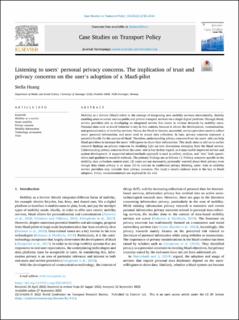| dc.contributor.author | Huang, Stella | |
| dc.date.accessioned | 2023-04-18T14:07:02Z | |
| dc.date.available | 2023-04-18T14:07:02Z | |
| dc.date.created | 2022-11-21T09:06:39Z | |
| dc.date.issued | 2022 | |
| dc.identifier.citation | Huang, S. (2022). Listening to users’ personal privacy concerns. The implication of trust and privacy concerns on the user’s adoption of a MaaS-pilot. Case Studies on Transport Policy, 10(4), 2153-2164. | en_US |
| dc.identifier.issn | 2213-624X | |
| dc.identifier.uri | https://hdl.handle.net/11250/3063635 | |
| dc.description.abstract | Mobility as a Service (MaaS) refers to the concept of integrating new mobility services electronically, thereby enabling users to access various public and private transport services via a single digital platform. Through MaaS, service providers aim at developing an integrated service that caters to various demands by mobility users. Personal data such as travel behavior is key in this context, because it allows the development, customization, and personalization of mobility services. Hence, for MaaS to become successful, service providers need to collect users' personal information, and users need to accept data collection. In turn, privacy concerns represent a potential hurdle for the success of MaaS. Therefore, understanding privacy concerns from the users' side can help MaaS providers to increase the users' willingness to share their information. This study aims to add on to earlier research findings on privacy concerns by shedding light on new dimensions emerging from the MaaS service. Understanding privacy concerns from the users' side is key in that regard, as it may enable improved service and system development. A sequential mixed-methods approach is used to collect, analyze, and “mix” both quantitative and qualitative research methods. The primary findings are as follows: (1) Privacy concerns specific to the mobility data collection context exist; (2) users are not necessarily personally worried about their privacy even though they claim privacy is an issue; (3) in contrast to traditional privacy thinking, users' trust in mobility service providers may override their privacy concerns. The study’s results indicate trust is the key to MaaS adoption. Policy recommendations are explored in the end. | en_US |
| dc.language.iso | eng | en_US |
| dc.publisher | Elsevier | en_US |
| dc.rights | Navngivelse 4.0 Internasjonal | * |
| dc.rights.uri | http://creativecommons.org/licenses/by/4.0/deed.no | * |
| dc.title | Listening to users’ personal privacy concerns. The implication of trust and privacy concerns on the user's adoption of a MaaS-pilot | en_US |
| dc.type | Peer reviewed | en_US |
| dc.type | Journal article | en_US |
| dc.description.version | publishedVersion | en_US |
| dc.rights.holder | The author | en_US |
| dc.subject.nsi | VDP::Samfunnsvitenskap: 200 | en_US |
| dc.source.pagenumber | 2153-2164 | en_US |
| dc.source.volume | 10 | en_US |
| dc.source.journal | Case Studies on Transport Policy | en_US |
| dc.source.issue | 4 | en_US |
| dc.identifier.doi | 10.1016/j.cstp.2022.09.012 | |
| dc.identifier.cristin | 2076994 | |
| cristin.ispublished | true | |
| cristin.fulltext | original | |
| cristin.qualitycode | 1 | |

